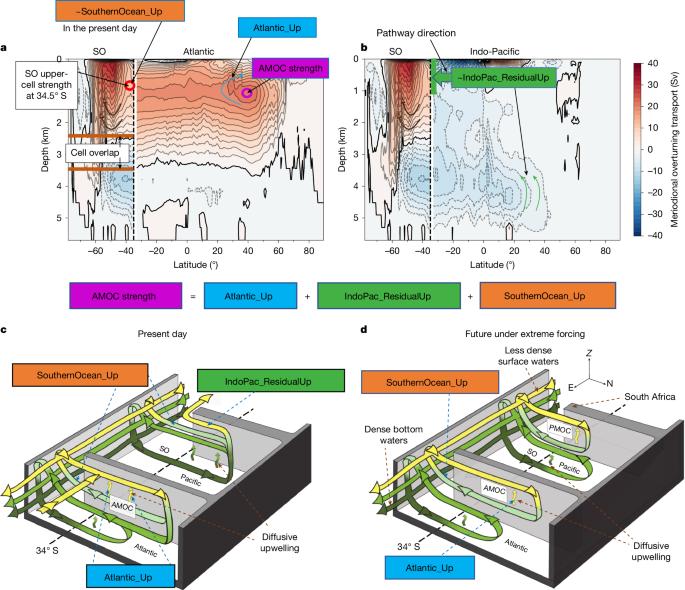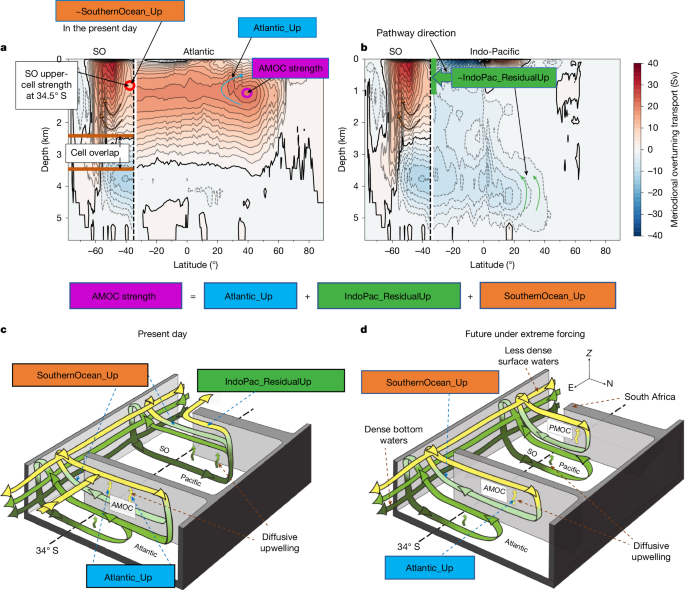即使在极端气候下,大西洋环流仍在继续
IF 48.5
1区 综合性期刊
Q1 MULTIDISCIPLINARY SCIENCES
引用次数: 0
摘要
大西洋经向翻转环流(AMOC)对大西洋向北的热输送至关重要,预计由于全球变暖而减弱,对全球气候产生重大影响。然而,AMOC减弱的程度是不确定的,在气候模式1、3和4之间存在很大差异,一些统计指标表明即将崩溃5。在34个气候模式中,我们表明AMOC对极端温室气体和北大西洋淡水强迫具有弹性。在持续的南大洋风的推动下,南大洋的上升流在所有情况下都维持着一个减弱的AMOC,防止其完全崩溃。由于南大洋的上升流必须通过大西洋或太平洋的下升流来平衡,因此只有在太平洋经向翻转环流(PMOC)发展的情况下,AMOC才会崩溃。值得注意的是,PMOC确实出现在几乎所有的模式中,但它太弱了,无法平衡所有的南大洋上升流,这表明本世纪不太可能出现AMOC崩溃。我们的研究结果揭示了AMOC的稳定机制,并对过去和未来AMOC的变化,从而对生态系统和海洋生物地球化学产生影响。他们认为,迫切需要更好地了解和估计南大洋和印度太平洋环流,以准确预测未来AMOC的变化。本文章由计算机程序翻译,如有差异,请以英文原文为准。


Continued Atlantic overturning circulation even under climate extremes
The Atlantic Meridional Overturning Circulation (AMOC), vital for northwards heat transport in the Atlantic Ocean, is projected to weaken owing to global warming1, with significant global climate impacts2. However, the extent of AMOC weakening is uncertain with wide variation across climate models1,3,4 and some statistical indicators suggesting an imminent collapse5. Here we show that the AMOC is resilient to extreme greenhouse gas and North Atlantic freshwater forcings across 34 climate models. Upwelling in the Southern Ocean, driven by persistent Southern Ocean winds, sustains a weakened AMOC in all cases, preventing its complete collapse. As Southern Ocean upwelling must be balanced by downwelling in the Atlantic or Pacific, the AMOC can only collapse if a compensating Pacific Meridional Overturning Circulation (PMOC) develops. Remarkably, a PMOC does emerge in almost all models, but it is too weak to balance all of the Southern Ocean upwelling, suggesting that an AMOC collapse is unlikely this century. Our findings reveal AMOC-stabilizing mechanisms with implications for past and future AMOC changes, and hence for ecosystems and ocean biogeochemistry. They suggest that better understanding and estimates of the Southern Ocean and Indo-Pacific circulations are urgently needed to accurately predict future AMOC change. Climate models suggest that the Atlantic Meridional Overturning Circulation is unlikely to collapse this century, owing to stabilization from wind-driven upwelling in the Southern Ocean.
求助全文
通过发布文献求助,成功后即可免费获取论文全文。
去求助
来源期刊

Nature
综合性期刊-综合性期刊
CiteScore
90.00
自引率
1.20%
发文量
3652
审稿时长
3 months
期刊介绍:
Nature is a prestigious international journal that publishes peer-reviewed research in various scientific and technological fields. The selection of articles is based on criteria such as originality, importance, interdisciplinary relevance, timeliness, accessibility, elegance, and surprising conclusions. In addition to showcasing significant scientific advances, Nature delivers rapid, authoritative, insightful news, and interpretation of current and upcoming trends impacting science, scientists, and the broader public. The journal serves a dual purpose: firstly, to promptly share noteworthy scientific advances and foster discussions among scientists, and secondly, to ensure the swift dissemination of scientific results globally, emphasizing their significance for knowledge, culture, and daily life.
 求助内容:
求助内容: 应助结果提醒方式:
应助结果提醒方式:


